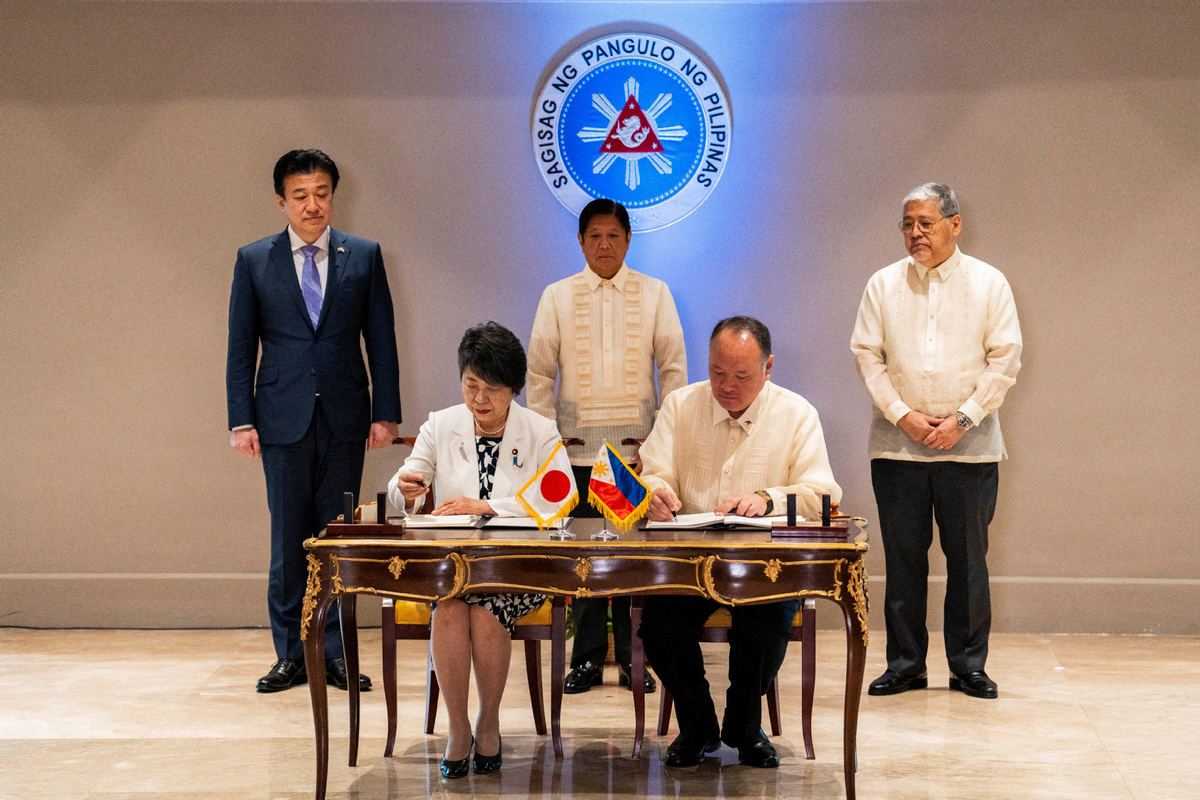日菲签署《互惠准入协定》 - 2024-07-14

Japan's Foreign Minister Yoko Kamikawa and Philippine's Defence Minister Gilberto Teodoro sign the Reciprocal Access Agreement, at the Malacanang Palace in Manila, Philippines, July 8, 2024.
The deepening of military cooperation between Japan and the Philippines has cast a long shadow over the security landscape of East Asia, with Japanese Defense Minister Minoru Kihara visiting the Philippines on Sunday and Monday for a"2+2" meeting between the two countries' foreign and defense ministers.
The meeting led to the signing of a "Reciprocal Access Agreement", allowing Japanese naval fleets to remain in Philippine ports during joint exercises and enabling both countries to conduct joint live-fire drills. The agreement, which will become effective once it's ratified by the parliaments of the two countries, signifies not only Tokyo's ongoing intervention in the South China Sea issue but also an explicit shift in Japan's security policy for countering China.
This shift is in line with Japanese Prime Minister Fumio Kishida's speech in the US Congress, on April 11 in which he called China the "greatest strategic challenge". The Kishida administration's support for Manila in the Ren'ai Reef dispute and its attempts to challenge China's maritime claims in the South China Sea underline this strategic orientation.
Yet the Japan-Philippines military cooperation is unlikely to substantially change the situation in the South China Sea.
Since the signing of the Declaration on the Conduct of Parties in the South China Sea in 2002, China and ASEAN member states have had an understanding on the importance of maintaining the status quo in territorial disputes and resolving the differences through dialogue, cooperation and joint development. Efforts continue to be made toward establishing a binding Code of Conduct in the South China Sea to prevent the situation from worsening further and thwart foreign military intervention in the issue.
The Ferdinand Marcos Jr. government's recent actions, including the upgrading of Philippine-Japanese naval cooperation and the regular deployment of Japan Maritime Self-Defense Force in the Philippines, contravene the commitments made in the Declaration on the Conduct of Parties. These moves, designed to gain the support of external powers such as Japan and the United States, exacerbate tensions in the region rather than defuse them.
China has demanded that the Philippines abandon or withdraw the BRP Sierra Madre which it grounded on the Ren'ai Reef in 1999, because historically China has exercised sovereignty over the reef and its nearby islands, islets, shoals and reefs. The Philippines should also withdraw the military vessel from Ren'ai Reef, because that is necessary for the conservation of the marine ecology and protection of the maritime environment.
A joint report by the South China Sea Ecological Center and the South China Sea Development Research Institute of China's Ministry of Natural Resources, titled the "Report of Illegally Grounded Military Vessel Destroying Coral Reef Ecosystem at Ren'ai Jiao", comprehensively and systematically evaluates the health of the coral reef ecosystem around Ren'ai Reef based on satellite remote sensing and on-site investigation data, while analyzing the reasons for the degradation of the coral reefs.
The report says the illegal grounding of the Philippine military vessel at Ren'ai Reef in China's Nansha Islands has seriously damaged the diversity, stability and sustainability of the coral reefs. Beijing has urged Manila to promptly withdraw or abandon the wrecked vessel. Beijing has also warned that if the Philippines attempts to reinforce the grounded vessel, China's Coast Guard law enforcement forces will intercept and prevent the Philippine forces from doing so.
This not only demonstrates Beijing's determination to adhere to the DOC but also highlights its efforts to persuade the Philippines to jointly develop the South China Sea into a sea of peace, friendship and cooperation.
But the ongoing confrontational attitude and actions of the Marcos Jr. administration aimed at boosting flagging public support at home will only escalate tensions and instability in the South China Sea.
East Asia, a key region driving global trade, technological innovation and wealth creation, faces complex international dynamics, especially because of the ongoing conflicts in Ukraine and the Middle East. Given these facts, China, Japan and the Philippines should ideally set aside their differences and disputes, hold talks and explore cooperative security measures to ensure the region's long-term stability and prosperity.
But by amplifying the "China threat" narrative and strengthening their military cooperation, Japan and the Philippines are undermining this potential and serving the interests of the US, which seeks to curb China's rise by strengthening its military and ideological alliances. Hence, the possibility of the RAA evolving into a full-fledged Tokyo-Manila military alliance, supported by the US, can't be ruled out. Such a development would signal a return to Cold War-era divisions and conflicts, posing a threat to peace and prosperity in East Asia.
Therefore, all the countries in the region must remain vigilant against outside interference and seek diplomatic solutions to differences, prevent further escalation of tensions and ensure a stable, cooperative and peaceful East Asia.
The author is Zhu Feng, the executive dean and a professor with the School of International Relations at Nanjing University.
Source: China Daily
